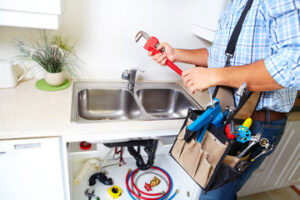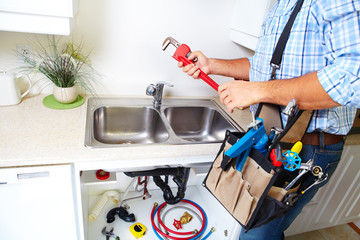Residential plumbing covers everything that deals with the water supply pipes, toilets, and fixtures within a single-family home. Woodland Hills Plumber can deal with clogged drains and broken pipes but also have the skills to install water-saving appliances and gas plumbing systems.
 Commercial plumbers work on large-scale projects like skyscrapers, malls and restaurants. This article will discuss the difference between residential and commercial plumbing and how to choose the right plumber for your needs.
Commercial plumbers work on large-scale projects like skyscrapers, malls and restaurants. This article will discuss the difference between residential and commercial plumbing and how to choose the right plumber for your needs.
Drains and pipes must stand up to a lot of wear and tear. That’s why it’s important to have them cleaned regularly. This helps to reduce stress on your pipes and prevents clogs, blockages, fractures and leaks. Having your drains professionally cleaned can also help you to avoid costly repair bills in the future.
Residential plumbers offer a wide range of drain cleaning services, from clearing bathtub and toilet clogs to unclogging floor and utility drains. They can even clean your septic tank and sewer line. If you notice unexplained puddles in your home, it’s likely that your drains are clogged. Call a residential plumber right away to get them addressed before the problem gets worse.
Clogged Bathroom Drains
Hair, soap scum, grime, toothpaste and other bathroom products can clog your home’s drains, leading to a variety of issues. When these clogs go unnoticed, they can cause serious water wastage and damage to your home’s plumbing. If you’re experiencing a blocked drain, give ARS Rescue Rooter a call to have it cleared.
Clogged Sewer Lines
Your home’s drains converge into one main sewer line, which must be free of clogs and obstructions to function properly. This line carries your home’s wastewater, including the waste from sinks, showers, tubs and toilets. The sewage must be clean and free of debris to prevent the buildup of gases that can wreak havoc on your health.
Commercial Plumbing
A commercial plumber works on a larger scale than a residential plumber and typically deals with a wider variety of materials. These plumbers may work on piping for heating, cooling and sprinkler systems in addition to toilets, bathtubs and showers. They may also be responsible for assembling, installing and repairing plumbing systems for water and sewage. These plumbers must be able to identify problems quickly and efficiently in order to provide the best customer service. They often require higher insurance coverage, extensive licensing and in-depth knowledge of building codes. Commercial plumbers are able to work on multiple buildings at once, which makes them more efficient than residential plumbers who must work on one home at a time.
Pipe Repair
When pipes get damaged or start to leak, it’s important to find and fix the problem quickly. This helps prevent further damage to your home, lowers your water bills and protects your health by ensuring that your drinking water is safe. There are a few different pipe repair options available, such as patching, soldering and replacing pipes. A residential plumber can help you decide which option is best for your home.
Older homes often have corroded pipes that need to be replaced. A leaking or broken pipe can cause flooding, low water pressure and other problems. Replacing these pipes will ensure that your home has the proper plumbing for years to come.
A residential plumber can also install new plumbing in your home for renovations and additions. They can handle everything from installing sinks and toilets to tubs, showers and dishwashers. Plumbing work in new construction is usually more extensive than maintenance or repair work, so a residential plumber may need to spend longer hours on the job than someone who works in existing buildings.
Commercial plumbing involves work in non-residential properties, such as office buildings, retail stores, restaurants and warehouses. A commercial plumber can handle all of the same tasks as a residential plumber, but they may have to deal with larger systems and more complicated building layouts. They can also be required to have certain qualifications or licenses in order to work on specific types of building projects.
Leaky pipes can be a major problem for businesses and homes alike. They can lead to high water bills, expensive repairs and even health issues. It’s important to have a plumber who can identify and repair these issues as soon as possible to prevent further damage.
While repairing a leaking pipe can be an effective solution in the short term, it’s usually more cost efficient to replace the entire pipe. This will eliminate the risk of future leaks and keep your water bills lower in the long run.
Depending on the extent of the repair, it could take one to two weeks for a commercial plumber to reline your pipes. The relining process is done by applying a special resin to the inside of your pipes that will prevent them from leaking.
Water Heater Installation
If your water heater is in need of replacement, a residential plumber can install the new unit quickly. In addition, plumbers have access to the best water heaters available – models that are more energy efficient and built with durable components than those sold at retail stores. These professional units typically come with a longer warranty than those sold at retail.
A professional water heater installation takes about six to 10 hours for two plumbing crew members, depending on the size of your home and whether a gas or electric model is chosen. A residential plumber will also ensure the new tank or tankless water heater meets local code requirements. For example, most gas-style water heaters need a certain amount of venting to prevent carbon monoxide poisoning. If the venting isn’t done correctly, combustion fumes will spill into your home instead of being vented outside.
Many homeowners try to save money on a new water heater by buying one at a retail store and then hiring a plumber to perform the installation. However, the plumbing company can’t guarantee the quality of the equipment or that it is an appropriate model for your home. Moreover, retail employees do not have the detailed knowledge of plumbing systems and water heating equipment that a licensed plumber has.
In addition, when you work with a retail plumber, you must communicate all of your issues and concerns through the retailer rather than directly with the plumbing company. This extra step increases the time and potential for error in resolving issues. Many homeowners have reported poor workmanship by retailers and hassles getting their issues resolved.
A commercial plumber deals with much larger-scale plumbing projects than those handled by a residential plumber. For instance, a restaurant may have several toilets and sinks in each bathroom, as well as numerous urinals in the restrooms. These systems require much larger pipes and more extensive maintenance than single-family homes. Licensed commercial plumbers are experienced in installing, maintaining and repairing these complex plumbing systems. They must also be familiar with a wide range of regulations and requirements for public buildings.
Sewer Line Repair
Despite the best of care and regular drain cleaning, a home’s sewer line can still develop a crack or break. There are several different methods that can be used to repair or replace a broken sewer line. The choice of method will have a large impact on the project’s cost.
A common cause of a cracked sewer line is root infiltration. This is when tree roots enter the pipes and cause cracking or clogging. Other reasons for a damaged sewer pipe include weather and ground movement, poor construction, and ageing of the pipes. Keeping up with routine maintenance, such as drain cleaning and having your lines regularly inspected by a professional plumber can help to prevent these issues.
One of the first steps a plumber will take is to locate the sewer pipe. This can be done by accessing the crawl space or basement. Once the location of the pipe has been determined, a repair can be planned.
Depending on the reason for the sewer line issue, repairs can range from a simple repair to replacing the entire line. If there is a crack in the line, a plumber will often opt to use an epoxy resin. This is injected into the pipe with a bladder, which is then deflated to allow the resin to adhere and fill the crack. This method is fast and cost-effective and works with PVC, cast iron, and clay pipes.
Sewer line issues can be quite messy and it is essential that any damage or clogs are repaired as soon as possible. It is also important to note that homeowner’s insurance usually does not cover the cost of a broken sewer line, even if it was caused by wear and tear or neglect.
A sewer line replacement can be a long and time-consuming project, especially if there are any unexpected challenges that arise. It is essential to find a plumber that has experience with these types of projects, as they are complex and can be expensive. The plumber can also help homeowners plan the work, including any necessary permits.

